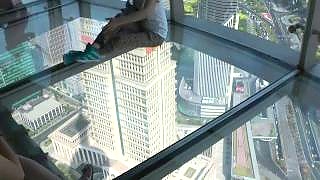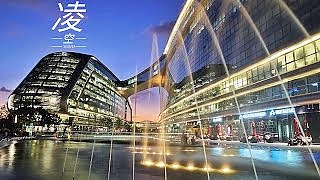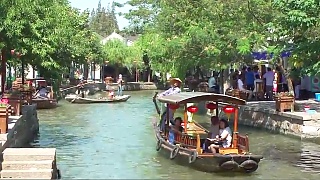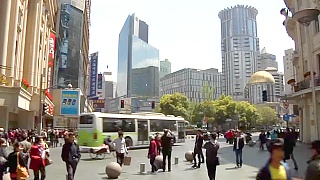Around the Yu Garden in ShangHai ...
[640],shadow=true,start=,stop=Chinese New Year (CNY), also known as the Spring Festival, is the most important traditional holiday in China, marking the beginning of the lunar new year. It is celebrated by Chinese communities around the world, as well as in other East Asian countries such as Taiwan, Singapore, and Malaysia. Here's an overview of Chinese New Year and its traditions:Timing and Duration:
Lunar Calendar: Chinese New Year follows the lunar calendar, with the date falling between late January and mid-February each year. The exact date varies because it is based on the lunar phases.
Festival Period: The celebrations typically last for 15 days, beginning on the eve of Chinese New Year and ending with the Lantern Festival on the 15th day of the lunar calendar.
Traditions and Customs:
Family Reunions: Chinese New Year is a time for families to come together and celebrate. Many people travel long distances to reunite with their relatives, leading to the largest annual human migration in the world, known as Chunyun.
Cleaning and Decoration: In the days leading up to Chinese New Year, families clean their homes to sweep away bad luck and make way for good fortune. They also decorate their homes with red lanterns, couplets (duilian), and paper cutouts featuring auspicious symbols.
Chinese New Year's Eve Dinner: The New Year's Eve dinner, known as 'reunion dinner' (??? tu�nni�nf�n), is a lavish feast shared with family members. Traditional dishes include fish (symbolizing prosperity), dumplings (symbolizing wealth), and various other symbolic foods.
Red Envelopes (Hongbao): Red envelopes containing money are given as gifts during Chinese New Year, especially to children and unmarried individuals. The red color symbolizes good luck and wards off evil spirits.
Fireworks and Firecrackers: Fireworks and firecrackers are set off at midnight on New Year's Eve and throughout the festival period to scare away evil spirits and bring good luck.
Lion and Dragon Dances: Colorful lion and dragon dances are performed in streets, parks, and public squares to bring prosperity and good fortune to communities.
Zodiac Animals:
Each Year is Associated with an Animal: Chinese New Year is symbolized by one of the 12 animals in the Chinese zodiac cycle. Each animal is believed to influence the personality traits and destiny of individuals born in that year.
Travel and Celebrations:
Spring Festival Gala: The Spring Festival Gala, broadcasted on Chinese television on New Year's Eve, features a variety of performances, skits, and musical acts. It is one of the most-watched television programs in the world.
Temple Fairs: Traditional temple fairs are held throughout China during Chinese New Year, offering food stalls, performances, games, and cultural activities for visitors to enjoy.
Chinese New Year is a time of joy, reunion, and renewal, filled with rich traditions and customs that have been passed down through generations. It is a celebration of family, community, and the arrival of spring, marking a fresh beginning and the promise of prosperity in the year ahead.
The Lantern Festival, also known as Yuanxiao Festival or Shangyuan Festival, is a traditional Chinese holiday celebrated on the fifteenth day of the first month in the lunar calendar, marking the end of the Chinese New Year celebrations. Here's some information about this colorful and joyous festival:
History and Origins:
Ancient Roots: The origins of the Lantern Festival can be traced back over 2,000 years to the Western Han Dynasty. It has evolved over time, incorporating elements from various cultural and religious traditions.
Taoist and Buddhist Influences: Initially, the festival had Taoist roots, with people making offerings to Taiyi, the god of heaven, to pray for good fortune and avert disasters. Later, during the Tang Dynasty, it also became associated with Buddhism, as monks would light lanterns to worship the Buddha.
Customs and Traditions:
Lantern Displays: The most iconic feature of the Lantern Festival is the elaborate lantern displays. These lanterns come in various shapes, sizes, and colors, often depicting animals, flowers, mythical creatures, and scenes from Chinese folklore.
Guessing Lantern Riddles: Another popular tradition is guessing lantern riddles (???, c?i d?ngm�). Riddles are written on strips of paper and attached to the lanterns. Visitors try to solve the riddles, adding an element of intellectual challenge and fun to the festivities.
Eating Yuanxiao: Yuanxiao (??), also known as tangyuan (??), are sweet glutinous rice dumplings stuffed with fillings like sesame paste, sweet bean paste, or peanuts. Eating yuanxiao symbolizes family unity and prosperity.
Dragon and Lion Dances: In some regions, dragon and lion dances are performed during the Lantern Festival, accompanied by drums, cymbals, and firecrackers. These lively performances are believed to bring good luck and ward off evil spirits.
Modern Celebrations:
Lantern Festivals: Throughout China and in Chinese communities worldwide, Lantern Festivals are held with grand lantern displays, cultural performances, and festive activities.
Tourist Attractions: Many tourist attractions host special Lantern Festival events, featuring intricate lantern installations, performances, and culinary delights.
Family Gatherings: Like other major Chinese festivals, the Lantern Festival is a time for families to come together, share meals, and enjoy each other's company.
Innovation and Modernization: While traditional customs are still observed, the Lantern Festival has also evolved with modern technology, incorporating LED lights, laser shows, and multimedia displays into the celebrations.
Overall, the Chinese Lantern Festival is a vibrant and symbolic celebration that brings communities together to welcome the new year with light, joy, and hope for the future.
Shanghai is one of China's most dynamic and cosmopolitan cities, blending a rich history with modern skyscrapers and vibrant culture. Here's what you need to know as a tourist visiting Shanghai:
Historical and Cultural Landmarks:
The Bund: This iconic waterfront promenade along the Huangpu River features colonial-era buildings on one side and futuristic skyscrapers on the other, offering stunning views of Shanghai's skyline.
Yu Garden: Dating back to the Ming dynasty, Yu Garden is a classical Chinese garden with pavilions, ponds, and rockeries. The nearby Yu Garden Bazaar is a great place to shop for souvenirs and traditional crafts.
Shanghai Museum: Home to an extensive collection of Chinese art and artifacts, including bronzes, ceramics, paintings, and calligraphy, the Shanghai Museum is a must-visit for history and art enthusiasts.
Jing'an Temple: One of Shanghai's most famous Buddhist temples, Jing'an Temple is known for its beautiful architecture, peaceful atmosphere, and towering golden Buddha statue.
Modern Attractions:
Shanghai Tower: Ascend to the observation deck of this iconic skyscraper, the tallest in China and the second-tallest in the world, for panoramic views of the city.
The Oriental Pearl TV Tower: Another iconic landmark, this futuristic tower offers observation decks, a glass-bottomed skywalk, and a revolving restaurant.
Shanghai Disneyland: Located in the Pudong district, Shanghai Disneyland offers a magical experience for visitors of all ages with its themed lands, attractions, and entertainment.
Shopping and Entertainment:
Nanjing Road: One of the world's busiest shopping streets, Nanjing Road is lined with department stores, boutiques, and restaurants. Don't miss the nearby pedestrian-friendly Nanjing Road East, known for its lively atmosphere and street performers.
Xintiandi: This upscale shopping, dining, and entertainment district features a mix of traditional Shikumen-style buildings and modern amenities, making it a popular destination for locals and tourists alike.
French Concession: Explore this historic neighborhood known for its tree-lined streets, charming cafes, boutiques, and art galleries.
Culinary Delights:
Shanghai Cuisine: Sample local specialties such as xiaolongbao (soup dumplings), shengjianbao (pan-fried dumplings), and Shanghai-style noodles.
Street Food: Wander through the city's bustling food markets and snack streets to taste a variety of street foods, from savory pancakes to grilled skewers.
Practical Tips:
Transportation: Shanghai has an efficient public transportation system, including the subway, buses, and taxis. Consider purchasing a rechargeable transportation card for convenience.
Language: While Mandarin is the official language, English is widely spoken in tourist areas, hotels, and restaurants.
Weather: Shanghai experiences four distinct seasons, with hot, humid summers and chilly winters. The best times to visit are spring (March to May) and autumn (September to November) when the weather is mild and comfortable.
Etiquette: Respect local customs and traditions, such as using polite language and avoiding loud behavior in public places.
Shanghai offers a captivating blend of old and new, with its historic landmarks, modern skyscrapers, vibrant culture, and delectable cuisine. Whether you're interested in history, architecture, shopping, or dining, Shanghai has something to offer every type of visitor.
 2023 Chinese New Year Lantern Festival walk
2023 Chinese New Year Lantern Festival walk


























